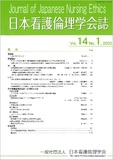Japanese
English
- 販売していません
- Abstract 文献概要
- 参考文献 Reference
Taiwan appears to be unique in requiring the assent of at least one close family member to a person's decisions on end-of-life care. Elsewhere in the world these provisions are an individual's sole responsibility and enacted on their own authority. Advance Care Planning (ACP) is part of the Patient's Right to Autonomy Act (PRAA), officially implemented in Taiwan in 20191, and requires that anyone recording their wishes must be accompanied by a family member. The Act appears to be the first legislation in Asia concerned with a person's rights when in an irreversible coma, in a permanent vegetative state, suffering from severe dementia or having an incurable disease with unbearable pain. For many people in Taiwan, Advance Care Planning (ACP) is a new term, which is incorporated in the PRAA but is not found in the Hospice Palliative Care Act (HPCA/also known as the Natural Death Act) which was implemented in 20001. The greatest difference between the PRAA and the HPCA is that the PRAA allows patients to determine their own medical treatments before reaching the end of their lives, with advice and assistance from medical specialists, when they face irreversible and unbearable effects of their illnesses. Under this Act, the patient can refuse any medical treatment, such as cardiopulmonary resuscitation (CPR). On the other hand, the HPCA only permits a terminally ill person to refuse life-sustaining treatment or to specify ‘do not resuscitate’ (DNR) if such preference has been indicated in their ‘Advance Directives’ (AD), a legal document stipulating a person's health care preference while they are able to make decisions. Both Acts aim to enable patients to decide how their own life should end. It is an important human rights issue for people to be able to decide how their life should finish when they are suffering intolerably. The core purpose of patient's autonomy is to bring about appropriate end-of-life care, based on the patient's own wishes and medical advice. This article explores the laws enacted by the HPCA and the subsequent PRAA in Taiwan and examines the influence of familism on these Acts. As a Taiwanese living in Japan for many years, the author would like to investigate this topic from an emic approach, i.e. an insider's cultural perspective.
Taiwan appears to be unique in requiring the assent of at least one close family member to a person's decisions on end-of-life care. Elsewhere in the world these provisions are an individual's sole responsibility and enacted on their own authority. Advance Care Planning (ACP) is part of the Patient's Right to Autonomy Act (PRAA), officially implemented in Taiwan in 20191, and requires that anyone recording their wishes must be accompanied by a family member. The Act appears to be the first legislation in Asia concerned with a person's rights when in an irreversible coma, in a permanent vegetative state, suffering from severe dementia or having an incurable disease with unbearable pain. For many people in Taiwan, Advance Care Planning (ACP) is a new term, which is incorporated in the PRAA but is not found in the Hospice Palliative Care Act (HPCA/also known as the Natural Death Act) which was implemented in 20001. The greatest difference between the PRAA and the HPCA is that the PRAA allows patients to determine their own medical treatments before reaching the end of their lives, with advice and assistance from medical specialists, when they face irreversible and unbearable effects of their illnesses. Under this Act, the patient can refuse any medical treatment, such as cardiopulmonary resuscitation (CPR). On the other hand, the HPCA only permits a terminally ill person to refuse life-sustaining treatment or to specify ‘do not resuscitate’ (DNR) if such preference has been indicated in their ‘Advance Directives’ (AD), a legal document stipulating a person's health care preference while they are able to make decisions. Both Acts aim to enable patients to decide how their own life should end. It is an important human rights issue for people to be able to decide how their life should finish when they are suffering intolerably. The core purpose of patient's autonomy is to bring about appropriate end-of-life care, based on the patient's own wishes and medical advice. This article explores the laws enacted by the HPCA and the subsequent PRAA in Taiwan and examines the influence of familism on these Acts. As a Taiwanese living in Japan for many years, the author would like to investigate this topic from an emic approach, i.e. an insider's cultural perspective.
Copyright © 2022, The Japan Nursing Ethics Associatin. All rights reserved.


